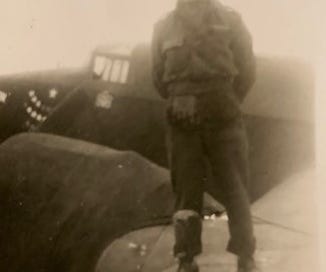My father would tell me only one war story. He spent the first years of World War II in Canada, a clerk in a RCAF office. There's a picture of him in uniform, brandishing a rifle, the Halifax harbour behind him. Then he was moved to England where he again worked at a desk. There's a picture of him on a golf course in Ireland.
Then the war was over, and my father was sent to France and Germany with the occupation forces. He found himself with the liberation army at the gates of Bergen-Belsen, the first concentration camp discovered by the British troops. It was at that point, after the allies had won and World War II was over, that my father's war began.
He would never say what it was, specifically, that caused it to happen. Perhaps he looked too long into eyes glazed with hunger and shadowed with pain, eyes belonging to men who looked a hundred years old, 'though they were in their twenties. Perhaps he could not stop staring at the piles of dead bodies, the bones and skulls, or perhaps he was required to record the numbers, the unfathomable numbers. Perhaps he could not bear the smiles of the survivors who welcomed their deliverers in silence. He would never say what it was, but something that day, in that place, made my father's mind stop. It stopped and he could not make it go beyond the horror and the fear.
The fear put him in a psychiatric hospital. He was afraid to leave it, afraid even to go for a walk beyond the grounds, afraid of hearing the German language spoken. One day a nurse came with some clothes and told him to get dressed. Thinking she was taking him for a walk in the hospital gardens, he complied. The nurse returned and escorted him out to the front gate. She pushed him beyond it, locked it behind him and, without a word, left him there.
The familiar panic attack was immediate, but this time something else rang in my father’s mind. In the midst of his fear he became overwhelmed with the need to find a church. So he started walking. He found one of the huge gothic cathedrals so common in Europe. It had been half destroyed by the bombs, but he stepped inside and sat on a remaining pew. Above the altar, high stained-glass windows glowed with light. As he stared, they began to move. My dad said he did not know how long he sat there watching, but the entire life of Christ flowed by before him, as though on a movie screen. When it was over, my father was no longer afraid. He returned to the hospital and told them it was time for him to go home. He was released shortly after.
My father’s war story is about a miracle, an event that healed his mind and his soul. In the midst of horror and fear, God was there. Isaiah said it well – “Surely God is my salvation; I will trust and not be afraid. The Lord, the Lord is my strength and my song; he has become my salvation” (Isaiah 12:2).
****




